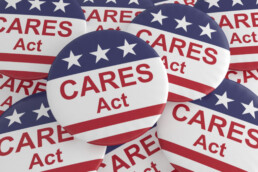California Protects Warehouse Employees Against Unfair Labor Practices

The on-going feud between state governments and big tech companies intensified on September 22, 2021 when California Governor Gavin Newsom signed California Assembly Bill 701 (A.B. 701), making California the first state to impose regulations on companies that require warehouse distribution center employees to meet unfair productivity quotas. A.B. 701 - the Warehouse Distribution Centers Bill - amends the California Labor Code to include new provisions taking aim at companies like Amazon that implement unfair labor practices that exploit employees in order to fulfill delivery orders. A.B. 701 also prevents job seekers from being discriminated against when applying for or pursuing a different job if the job applicant filed to receive worker’s comp benefits during prior employment.
What is A.B. 701?
Generally, the purpose of California Assembly Bill 701 (A.B. 701) is to protect warehouse distribution center employees against impending job loss for failing to meet employer established productivity quotas. The author of the new law, California Assemblywoman Lorena Gonzalez states, “worker’s aren’t machines. We’re not going to allow a corporation that puts profits over worker’s bodies to set labor standards back decades just for same-day delivery.” The new law will protect both current and former workers employed at a warehouse distribution center.
What is a productivity quota?
A.B. 701 defines quota as a work standard under which an employee is assigned or required to perform at the specified productivity speed or perform a quantified number of tasks, or to handle or produce a quantified amount of material, within a defined time period and under which the employee may suffer an adverse employment action if they fail to complete the performance standard.
Essentially, a quota is created by the employer or company of which the employee is responsible to meet. The quota consists of the number of tasks the employee is expected to complete within a certain amount of time. The problem arises when the quota is unfair, yet employees are still expected to perform tasks to complete the quota, and if the employee cannot do so, then the employee may experience an adverse employment action.
What is an adverse employment action?
In California, an adverse employment action is viewed as any type of retaliatory action taken by an employer that is reasonably likely to have a negative effect on an employee’s job performance, opportunities for a promotion, or ability to seek employment elsewhere. The most common examples of an adverse employment action are job loss or termination, reduced wages, and demotion to a lower employment position or job title.
What changes will happen because of A.B. 701?
Currently, companies like Amazon are not held accountable for providing employees with adequate notice of their productivity quotas and the adverse employment actions that may occur for failing to meet those quotas. A.B. 701 requires companies to provide more transparency to warehouse distribution center employees. For example, the bill provides greater protections to warehouse distribution center employees in the following ways:
- Employers must provide adequate notice to every existing and new employee in writing describing each quota the employee is responsible to meet;
- Employers must provide notice to all employees in writing of any adverse employment actions that may result from failing to meet a quota;
- Employees will not be required to meet a quota that violates the employee’s right to meal and rest or break time, including using the bathroom;
- Employers are prohibited from taking any adverse employment action against an employee for not meeting a quota if the quota violates the employee’s right to meal and rest or break time, including using the bathroom;
- Employees must receive productive time credit towards any quota for actions taken by the employee to comply with California’s health and safety laws for the workplace;
- Employees may receive productive time credit towards any quota during meals and rest or break time if the employee is required to be on call during those times;
- Current and former employees have the right to request a written description of each quota and a copy of the most recent 90 days of the employee’s performance towards meeting the quota if the employee believes the company created a quota that violates the employee’s right to meals and rest or break time.
Another key component of the new law is that employees will have the ability to file a lawsuit for injunctive relief to obtain court ordered compliance with the law against employers and companies. Employees that are successful in the lawsuit for injunctive relief may be awarded suspension of the unfair quota, the court may reverse an unlawful termination of the employee for not meeting a quota that violated the employee’s labor rights, the employer and company may be ordered to cover the employee’s costs and attorney’s fees for filing the lawsuit. Each case will depend on the specific facts, so it is important to consult with an experienced labor law attorney to assess the specifics of your case.
A.B. 701 is scheduled to take effect in California on January 1, 2022.
Free Consultation
Srourian Law Firm, with locations in Los Angeles, Westwood, Woodland Hills, and Orange County is experienced in all aspects of employment law including Warehouse Employee related health and safety violations in the workplace, and have aggressively represented employees in Los Angeles, Hollywood, Santa Monica, Orange, Irvine, Anaheim, Santa Ana, Newport Beach, Costa Mesa, Fullerton, Tustin, Mission Viejo, San Clemente, Garden Grove, Laguna Niguel, Brea, Fountain Valley, Aliso Viejo, Yorba Linda, Westminster, Laguna Hills, Cypress, and La Habra.
If you or someone you know suffered employment violations, you may have certain employee rights under state and federal law, and may be entitled to compensation as a part of a class action lawsuit. Please contact us to speak with one of our lawyers for a free consultation.
Federal Government Clarifies CARES Act Eligibility

As the country continues to struggle with the challenges due to COVID-19, labor laws have been adapting to the pandemic, and employees must be aware of their rights. One area that has been significantly impacted by COVID-19 is the laws regarding unemployment benefits. The federal and state laws that govern unemployment benefits have always been complicated, and are especially difficult to understand now with the Coronavirus Aid, Relief, and Economic Security Act (CARES) that was enacted in March 2020. CARES expanded weekly unemployment benefits by as much as $600 a week to eligible workers and have proven to be vital to many families during the pandemic. While there have been a myriad of issues and concerns regarding CARES, there is no denying that to many unemployed workers relied on the additional funds as the nation’s unemployment rate sky-rocketed. Moreover, many states were overwhelmed with the volume of applications, and benefits were delayed.
While it is uncertain whether the CARES Act will be extended, the federal government provided some clarification on July 22, 2020. For example, a worker may refuse to accept a job offer because the job is unsafe and continue to collect the additional financial benefits provided under CARES. The states, however, will determine what is considered to be safe work conditions, and if a state determines the job or work conditions are not “suitable,” then the worker may receive the expanded unemployment benefits under CARES. Most states already had suitable work place provisions in place prior to COVID-19, and the general criteria is whether the work unreasonably exposes the worker to unsuitable safety risks. Labor laws have always guaranteed a safe work environment, which is particularly important during a pandemic. Notably, a worker cannot refuse a job offer and seek expanded unemployment benefits due to a general fear of COVID-19.
According to the U.S. Department of Labor, the state may also determine that a job is unsuitable if a worker refuses the job due to virus-related reasons such as increased risk of COVID-19 due to an underlying medical condition. The state may also determine a job is unsuitable if a worker claims “good cause,” although the federal government has not specifically defined what is considered to be “good cause” which means that states must decide that issue. Fortunately, workers in California benefit from some of the country’s strongest state labor law protections, and this is one example of how an experienced labor law attorney will be able to argue your case by understanding state laws to protect your rights when federal law is not clear.
The federal government also clarified that some out-of-work employees are not eligible for CARES benefits depending on what caused the loss of the job. For example, if a worker is unemployed due to a reason not related to COVID-19, that worker is not eligible for expanded benefits even if jobs are not available due to COVID-19 related circumstances. The reason for this is because CARES was enacted to assist workers who faced unemployment specifically due to the pandemic, and is not broad enough to include workers who did not lose their jobs due to reasons unrelated to COVID-19. Fortunately, those workers may still be eligible for regular unemployment benefits.
Prior to COVID-19, workers who quit their jobs without “good cause” were generally not eligible for unemployment benefits. However, under the CARES Act, certain reasons related to COVID-19 would allow a worker to qualify for expanded unemployment benefits under CARES. For example, a worker who quits a job because of mandatory quarantine, or the need to provide care to a family member with COVID-19 could be considered “good cause” for the purposes of CARES benefits.
While the federal government continues to debate whether to extend benefits under the CARES Act or perhaps craft new legislation, the states may decide to adopt new policies regarding eligibility in the meantime. However, since unemployment benefits are a hybrid of federal and state law, the states must adhere to federal law and provide at least the minimum benefits afforded under federal laws. Also, as more states work towards re-opening and more businesses are hiring, states may become stricter in determining eligibility for unemployment benefits. As we have learned, during a pandemic, it is important to be informed and be ready to take full advantage of any benefits you are eligible for. Plan ahead and consult an experienced labor law attorney so you will have an advocate that will not only understand the quickly changing laws and benefits, but will be able to guide you and protect your rights during these uncertain times.
FREE CONSULTATION
Srourian Law Firm, with locations in Los Angeles, Westwood, Woodland Hills, and Orange County is experienced in all aspects of employment law including unemployment benefits and have aggressively represented employees in Los Angeles, Hollywood, Santa Monica, Orange, Irvine, Anaheim, Santa Ana, Newport Beach, Costa Mesa, Fullerton, Tustin, Mission Viejo, San Clemente, Garden Grove, Laguna Niguel, Brea, Fountain Valley, Aliso Viejo, Yorba Linda, Westminster, Laguna Hills, Cypress, and La Habra.
If you or someone you know suffered employment violations involving unemployment benefits, you may have certain employee rights under state and federal law, and may be entitled to compensation as a part of the class action lawsuit. Please contact us to speak with one of our lawyers for a free consultation.


